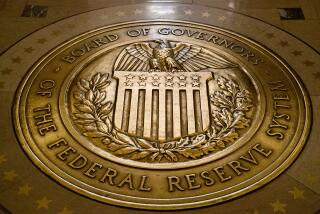The ambush waiting for Bernanke
MOST FED chairmen are blindsided early on in their tenure.
Alan Greenspan faced a stock market crash two months after he took over in August 1987. Paul Volcker had to cope with a rout in the bond market three months after he became chairman in August 1979. G. William Miller was challenged immediately by a dollar crisis in the spring of 1978. For Arthur Burns, it was the inflation bogie in the early 1970s.
What’s more, this indoctrination by fire has tended to take the new Fed chief -- who is arriving without his predecessor’s hard-won credibility -- well out of his comfort zone.
Burns, the business cycle expert, was ill-equipped to cope with inflation. Miller, the businessman, didn’t understand financial markets. Volcker, the expert on international finance, had to deal with a major recession. And Greenspan, the business consultant, was thrust into crisis management.
Ben Bernanke, I suspect, will meet a similar fate. It’s true that, on the surface, he seems to be the perfect candidate to deal with the one problem everyone is worried about today -- inflation. The oil shock of 2005 has taken retail energy prices up 35% over the last year, and there are 1970s-style fears that a spillover to other prices can’t be too far behind.
And Bernanke is widely thought to be the perfect central banker to cope with this problem. He is renowned for his skills as an inflation fighter. He has led the charge in the academic debate over “inflation targeting” -- arguing that a central bank needs to be explicit in aligning its policy instrument (the federal funds rate) with a numerical target of price stability (a 1% to 2% increase in the “core” consumer price index).
But I suspect that the current inflation scare will turn out to be a false alarm. As always, energy prices will come down when demand sags -- some of that may already be occurring -- and the new and powerful forces of globalization should continue to hold other prices largely in check.
The U.S. economy actually faces far greater threats than inflation -- threats that an inflation targeter such as Bernanke may be ill-equipped to deal with.
At the top of the list is a record U.S. current account deficit -- the broadest measure of the nation’s trade balance (imbalance, in this case) with the rest of the world. Running at an annual rate of close to $800 billion in the first half of 2005, it requires foreign funding to the tune of $3 billion per business day. To accomplish that without a sharp drop in the dollar and/or a related backup in interest rates requires extraordinary confidence on the part of foreign investors in U.S. assets.
The foreign confidence factor could well be Bernanke’s biggest challenge when he takes the reins at the Fed. The nation’s current account deficit averaged just -1.5% of gross domestic product at the three most recent Fed transition points -- the ascendancy of Miller, Volcker and Greenspan.
By contrast, today’s deficit is more than four times larger at -6.4%. Moreover, in the face of an energy shock and a post-Katrina fiscal spending binge, there is good reason to look for a further reduction in U.S. saving and a related widening of the current account deficit over the next year.
In short, the U.S. is going to be asking a lot more of the foreign investor at precisely the moment the Fed is transitioning from Greenspan to Bernanke. As the maestro leaves the building, the hard-won aura of foreign confidence that surrounds him could be quick to follow. Bernanke could be faced with a dollar crisis and the related need on the part of foreign investors to seek compensation for taking currency risk. That compensation invariably spells higher interest rates -- the last thing the nation’s housing bubble and overly indebted consumers need.
During the Greenspan era, the U.S. economy pushed the envelope in sustaining an increasingly dangerous strain of unbalanced growth. In doing so, it experienced an equity bubble, a housing bubble, a record current account deficit and a monstrous overhang of household debt. The U.S. has gotten away with these imbalances because of the “kindness of strangers” -- the willingness of foreigners to keep investing in dollar-based assets.
But the confidence that underpins foreign funding of the U.S. is a very fragile commodity. Fed transition time usually unmasks that fragility. Like the chairmen who preceded him, Bernanke could quickly find himself dealing with a confidence crisis. And suddenly, the inflation targeter will be staring at a far more intractable set of problems than his research and training prepared him for.
History warns us to expect the unexpected when the nation’s second-toughest job changes hands.
More to Read
Get the L.A. Times Politics newsletter
Deeply reported insights into legislation, politics and policy from Sacramento, Washington and beyond. In your inbox three times per week.
You may occasionally receive promotional content from the Los Angeles Times.









